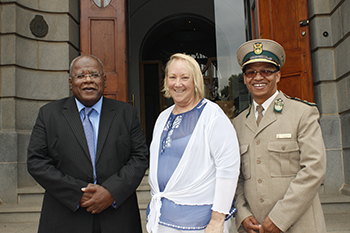Latest News Archive
Please select Category, Year, and then Month to display items
![]()
The National Research Foundation (NRF) ratings are considered the benchmark for research excellence. This year the University of the Free State (UFS) has 17 newly NRF-rated researchers. This brings the total number of NRF-rated researchers at UFS to 160.
NRF ratings are allocated based on a researcher’s recent research outputs and impact as perceived by national and international peer reviewers. The rating system encourages researchers to publish high-quality research papers in journals of high impact and to publish books through reputed academic publishers. The NRF rating system is a valuable tool for benchmarking the quality of our researchers against the best in the world.
Research at the heart of the UFS
Prof Francis Petersen, Rector and Vice-Chancellor, has indicated that the UFS provides significant support to researchers to apply for new NRF ratings or to re-apply for rating. These initiatives include the mock NRF rating panels managed by the Prestige Scholars Programme (PSP), evaluation of individual research outputs and recommendations on timely applying for rating, and improvements on rating applications by a panel consisting of internal and external members. These initiatives are bearing fruit by increasing the number of rated researchers who will transform the research profile and increase the diversity of UFS researchers.
Cultivating the best researchers.
According to Eleanor van der Westhuizen, from Research Development: “The rating of individuals is based primarily on the quality and impact of their research outputs over the past eight years, taking into consideration the evaluation made by local and international peers. It identifies researchers who count among the leaders in their fields of expertise and gives recognition to those who have a sustained production of high-quality research outputs. Several South African universities use the outcomes of the NRF evaluation and rating process to position themselves as research-intensive institutions, while others such as the UFS provide incentives for their staff members to acquire and maintain a rating.”
Cream of the crop
The UFS has also upped the ante with regard to its total number of NRF-rated researchers during the latest rating and evaluation, with an increase from 149 to 160 rated researchers in 2018.
Prof Heidi Hudson, Dean of Humanities, received an NRF B-rating, which brings the total of B-rated researchers to six. Other B-rated researchers incude Prof Johann Meyer (Mathematics), Prof Fanie Snyman and Prof Francois Tolmie (Theology), Prof Felicity Burt (Medical Microbiology) and Prof Andre Roodt (Chemistry). A total number of 10 new C-ratings and six new Y-ratings were achieved during the 2018 evaluation process.
“NRF-rating is indicative of the university’s drive to enhance its research profile nationally and internationally. Congratulations to all the scientists and scholars who received a rating in 2017. I am thankful to our academics for their commitment to the rating process,” said Prof Corli Witthuhn, Vice-Rector: Research at the UFS.
UFS Postgraduate student council’s community project a success
2016-03-03

Prof Jansen Vice-Chancellor and Rector, Dr Henriette van den Berg, Director of Postgraduate School, and Mr Gustav Wilson, Regional Head: Development and Care, Free State and Northern Cape Region. |
The University of the Free State’s Postgraduate Student Council embarked on a courageous community engagement project for Mandela Day in 2015. The programme was aimed at assisting offenders at Tswelopele Correctional Centre pass their matric exams, thus granting them access to tertiary education.
The Postgraduate Student Council assisted the 2015 matriculants with study support, and motivated them during their final examinations in 2015. The council will play a bigger role this year by offering offenders at Tswelopele career advice and career guidance for when they leave the correctional facility, as well as study techniques to assist them throughout the year, to ensure a 100% pass mark in 2016.
Offenders who had participated in the Postgraduate Student Council project attended the Postgraduate School’s Open Day on 19 February. Of the 12 offenders, 11 passed their matric exams, while one is currently busy with his supplementary exams. Tswelopele has a 92% pass rate; it is the best performing correctional centre in South Africa.
The Tswelopele Correctional Centre also serves as a full-time high school (Grade 10-12), and TVET College, assisting offenders to register for tertiary education through various universities.
Prof Jonathan Jansen, Vice-Chancellor and Rector of the University of the Free State, said that he was immensely proud of the matriculants from Tswelopele Correctional Centre. He added that it is vital for every human being to receive a second chance. “Rehabilitation programmes are meant to give offenders a second chance at life, because we cannot give up on humanity. Correctional centres and rehabilitation centres are a societal responsibility. Society must not give up on offenders, everyone deserves a second chance, and we cannot give up on humanity.”
“To our offenders going through rehabilitation and all our young people who are our hope for the future of our beloved country, be encouraged. Dream again. Discover the wonder in your lives,” said Mr Gustav Wilson, Regional Head: Development and Care, Free State and Northern Cape Region.